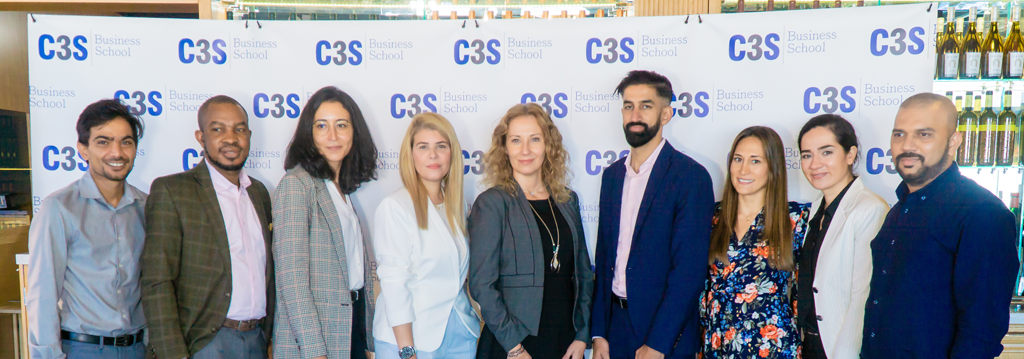BA (Hons) Business Management top-up
- Duration : 12 Months
- Modality: 100% online
- Language : English
- Tution Fees: €6500 /Year
- Intake: September
- Awarding Bodies: Abertay University, UK
Overview of the programme:
By selecting this top-up degree that will give your career a jump start, you will discover how businesses operate.
You’ll gain the knowledge and practical skills necessary to work as a manager in the digital industry. You’ll discover how to prosper in the dynamic, international economy of today.
Your abilities will therefore be applicable anywhere, whether your goal is to launch your own firm or work for an organization.
As the programme is 100% online, you can continue working and growing your profession while incorporating learning into your current professional commitments
Learning aims:
- a broad integrated study of all types of business organizations and their underlying operating principles and practices;
- a study of the wider context of organizations, how they are managed and the changing environment in which they exist;
- the development of key skills associated with managing high performance organizations; and
- lifelong learning and employability skills to enable you to prepare for a future career in business and management and to play an active part in the development of local, national and international organizations.
Learning outcomes:
- Knowledge & Understanding: Demonstrate integrative and specialist knowledge, and critical understanding of business and management principles, concepts, contexts, approaches and challenges key to organizations of various kinds
- Applied Knowledge & understanding: Apply a range of general and specialized knowledge and skills to define and execute an organization-related project in the field of business.
- Generic Cognitive skills: Research, critically analyze, interpret and formulate solutions to organizational challenges and, in doing so, display originality and creativity in handling complex issues
- Communication, ICT & Numeracy: Effectively communicate information and objective argument, in writing and speech, in professional contexts using both analogue and digital tools.
- Communication, ICT & Numeracy: Interact and interpret numerical data and appreciate statistical concepts and communicate this in an audience appropriate manner.
- Communication, ICT & Numeracy: Analyze the role technology plays in organizations and the challenges and benefits of digital transformation.
- Autonomy, Accountability and working with others: Exercise appropriate autonomy and initiative, assume responsibility, collaborate effectively, and deal with complex ethical and processional issues
- Autonomy, Accountability and working with others: Critically reflect on your own ideas, work and performance to determine personal development needs
Career Opportunities:
A bachelor’s degree in business administration offers you a wide range of job options by providing you with a comprehensive set of skills that are in high demand among companies.
The types of roles that can be offered – Marketing Manager, Sales Manager, Operations Analyst, General Manager, Business Process and Design Analyst, Procurement Manager, Business Development Manager, International Sales Manager, among other positions.
Module Overview
BMT409 Strategic Management
Outline
To succeed in the future, managers must develop the resources and capabilities
needed to gain and sustain advantage in competitive markets. The way in
which organizations attempt to develop such competitive advantage
constitutes the essence of their strategy.
Indicative content
- Introduction to strategic management: What is strategy; strategic analysis;
classical and emergent schools; strategic thinking; levels of strategy. - Strategy context. Competitive advantage of a firm: Defining the business
environment. Industry analysis: turbulence and dynamics. Porter’s five forces; new
dynamics in the 21st century. - Business level strategy: Sources of competitive advantage: Competitive stance,
business level strategy, corporate level strategy; generic strategies; hybrid
strategy; value chains. - Beyond competition: The nature of competition; co-operation; co-opetition;
strategic alliances and joint ventures; mergers and acquisitions. - Strategy in the public sector: Public-private partnership as a strategic tool of
public sector management
BMT403 Managing Change
Outline
You’ll combine theory and practice to examine organizational change and
transformation in times of uncertainty
Indicative content
- Analyzing change contexts and drivers: The change context: globalization,
technology, and changing market dynamics; change management and
sustainability - Theories of change and approaches to change management: Models of change
and change management; trans- formational change and organizations; Critical
discourse in change management. - Human resources issues in change management: Participative change ;
managing psychological contracts, social identity, stakeholder positioning and
dynamics in times of radical change ; voice, dialogue and rethinking resistances
in radical change; Culture, habits and unlearning. - Change in context: (this will change each year and will form the basis of the
guest lectures) - Leading and managing change: Transactional and transformational leadership; a
competency framework for transformational leadership; values and value-based
systems in transformational change
BMT404 Innovating for Growth
Outline
Undertake some practical research in response to a current business need of a
real company and produce a suitable management report with
recommendations.
Indicative content
- Analyzing a problem: Using different analysis techniques such as data flow
diagrams, entity relationship modeling and process mapping, examine
problems to better understand the current position of the business. - Innovation and innovation techniques: Using different creativity and innovation
tools to help find solutions to business problems - Innovation for global growth (IGG): Work with multiple organizations – public,
private and third sector, on a challenge they currently face. This will provide a
scoping opportunity for the problem and a chance to test possible solutions.
Prior to this event discussions on professional behavior and communication will
take place. - Developing and presenting the solution: Take the solutions identified during
IGG and further investigate their suitability. Develop one or more solutions to
provide an implementation plan for the organization.
BMT401 Contemporary Issues
Outline
Contemporary accounting, business and management issues and to gain an
in-depth understanding of current thinking
Indicative content
- Business and management: Contemporary issues in general management
- Human resource management: Contemporary issues in human resource
management, organization theory and structure - Marketing: Contemporary issues in marketing
- Accounting and finance: Contemporary issues in accounting and finance.
BMT406 International Business & Management
Outline
This module provides a framework for the study of the challenges of managing
in complex international business environments.
Indicative content
- Introduction: The theoretical background: Globalization and international
business; Analysis of international external business environment; political
factors; economical factors; social factors; technological factors and
implications for international managers; International trade theories and
practices. - International Business Strategies: Strategy and international business; Country
evaluation and selection; Export and Import strategies; Direct investments and
collaborative strategies. - International and cross-cultural management: International Dimensions of
Culture: Understanding various dimensions of culture; Hofstede’s (1980) National
Culture Approach and Trompenaars (1993) Cultural Dimensions. Implications for
International Managers. managing employee relations in multiple contexts - Managing in international contexts: Culture and Negotiations: Understanding
the relationship between culture and negotiations; how to reconcile possible
conflicts regarding differences in culture and negotiations. - Contemporary issues in managing international business: Managing
international work assignments, Understanding the implications of CSR on MNE
decision making.

Teaching Methodology
On the Campus
- Lectures in the Classroom
- Seminars and Workshops
- Learning through Doing
- Research and field trips
- For debate and discussion, students will need to contribute through independent learning, extensive background learning, and inputs during seminars and tutorials.
For the Final Year Top-up
The modules you take and the work-based learning projects you complete will determine how you are taught.
The vast majority of the course is provided through our interactive virtual learning environment. You’ll have plenty of academic assistance and resources with access to all of the study material you’ll need, discussion forums, and the opportunity to engage with classmates and lecturers via chat sessions.
You may be able to study on campus, experiencing face-to-face teaching techniques, depending on the courses you study and your region.
Admission Requirements
-
- Application form
- OTHM level 4 & 5 Diploma in Business Management certificates
- Official transcripts
- Copy of passport
- Updated CV
- Reference letter from former academic institution or current employer (if applicable)
- IELTS overall 6.5 (with minimum 6.0 in each) or C3S Credibility Interview

FEES
*Payment instalment plans are available. Please contact C3S’s Administration Department for further details



Application fee
Non-refundable, paid with application : €300
Full Time
€5,000/year
Program Duration
12 Months
The Business Management (top-up) course fee is £3,950 and starts in September, January and May.